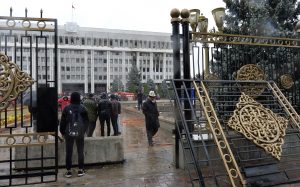Kyrgyzstan’s ruling elites are getting closer to solving the country’s prolonged crisis of legitimacy.
To recap, the situation spun out of control after Kyrgyzstan’s parliamentary elections on October 4. The next day, security forces used violent tactics to control demonstrations against the slate of entirely pro-establishment parties that secured seats for the next parliament. The night ended with civilians occupying the White House, which houses Kyrgyzstan’s executive branch, and a series of self-appointed power grabs.
On October 6, the Central Election Commission decided to annul the election results; later that day, both the prime minister and speaker of parliament resigned from their posts. President Sooronbay Jeenbekov’s announcement that he would resign as soon as parliament formed a new government raised the stakes for pushing through a new prime minister.
In an attempt to fill the power vacuum, there were range of extralegal attempts to appoint a new prime minister. The most perplexing proposal came on October 9, when former President Almazbek Atambayev and former Prime Minister Sapar Isakov organized a rally to back Omurbek Babanov – who lost against Jeenbekov in the presidential elections in 2017 and fled the country for fear of repression – for prime minister. The rally where this was announced turned violent, though, and when politicians gathered an extraordinary session of parliament on October 10, Babanov was not discussed as an option for prime minister. Instead, the deputies who made it to the session voted to elect Sadyr Japarov – who until October 6 had been serving a lengthy prison sentence for hostage-taking and an attempted coup – as acting prime minister.
For a day, it seemed as though the door had closed and Japarov had secured his position. Most of those who were broken out of jail on October 6, including Atambayev, were sent back behind bars. Several additional politicians were placed in pre-trial detention under accusations of “organizing mass unrest,” including two Bir Bol candidates who appointed themselves as commandant of Bishkek and head of national security.
After maintaining a low profile for several days, on October 13, President Jeenbekov sent back parliament’s decree that would have formed a new government under Sadyr Japarov. “To maintain and strengthen stability in the country, all our decisions must be legitimate and not subject to doubt,” Jeenbekov said in the announcement. Jeenbekov’s emphasis on legitimacy reflects a debate among politicians and legal scholars that played out following the October 10 parliamentary session. Although 61 votes were cast for Japarov, constituting a quorum, there were only 51 people actually present in the room to vote.
With the legitimacy of the selection process called into question, parliament gathered for another extraordinary session on the evening of October 13. This time, 80 of 120 deputies showed up, but candidates for prime minister were not discussed. Instead, parliament backed Kanat Isayev for speaker. Filling this position is important and can be read as a win for Jeenbekov; without a speaker, whoever was serving as prime minister would have temporarily assumed the presidency if Jeenbekov had resigned. Isayev was quick to come out in favor of Jeenbekov remaining in power, saying that the country’s stability depended on it.
While Isayev assuming the speakership removes some of the uncertainty driving Kyrgyzstan’s political crisis, two big questions are still unresolved. First, who is Kyrgyzstan’s prime minister? Second, what’s happening with regard to new elections?
It seems likely Japarov will end up as prime minister. In his comments to the press after the extraordinary session, Isayev didn’t sound like he was inherently opposed to Japarov serving as prime minister. Another parliamentary meeting will be necessary to discuss the options and vote for new leadership to resolve remaining uncertainties about parliamentary elections.
A Bishkek court ruled against an appeal contesting the Central Election Commission (CEC)’s annulment of the parliamentary election results, meaning it’s likely that there will be new elections soon. Politicians recognize that the way Kyrgyzstan’s electoral institutions are designed shaped the outcome – specifically, the 7 percent national threshold that parties must clear to secure seats is high relative to other countries with parliamentary governments. Deputy Dastan Bekeshev called for lowering the threshold to 3 percent in new elections, which would make it much more likely for opposition voices to clear the barrier.
At this point, it is impossible to predict what new election rules might look like, though it is doubtful that the CEC will be able to block the parties accused of vote-buying from participating, given that these parties are backed by the country’s most powerful politicians. The whole episode is an important reminder of the immense challenge of trying to change the rules of the game while the game is still being played – incentives to protect one’s own interests, which in the case of many Kyrgyzstan’s parliamentarians means trying to avoid jail time, undermine prospects for sweeping reforms.

































